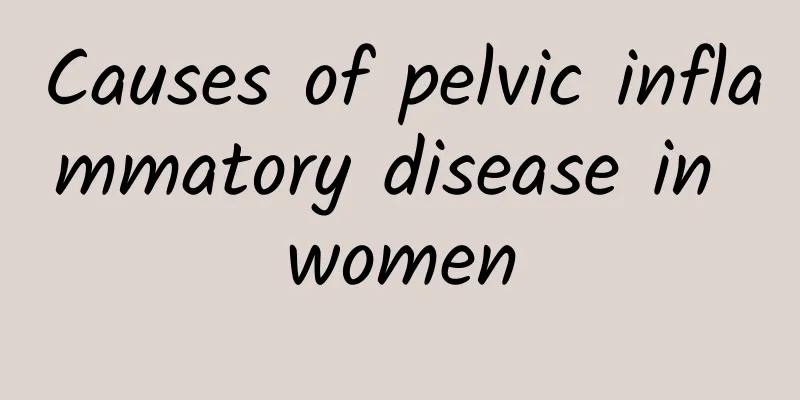What are the causes of threatened miscarriage?

|
Miscarriage is something that many people have experienced. Before a miscarriage, there are often some signs of impending miscarriage. We call these symptoms threatened miscarriage. However, the occurrence of threatened miscarriage does not necessarily mean miscarriage. It can still be saved by symptomatic treatment of the cause of miscarriage. So what causes threatened miscarriage? Causes of threatened miscarriage Why do women have threatened miscarriage? I believe many people don't know this. Since we don't know, let's take a look at it together. 1. Uterine malformation If the expectant mother has uterine malformations such as bicornuate uterus, uterine septate and uterine hypoplasia, it will affect the implantation and development of the embryo and lead to miscarriage; relaxation of the internal os of the uterus or deep laceration of the cervix will cause premature rupture of the membranes and late miscarriage. The first pregnancy checkup is particularly important because usually during the first pregnancy checkup, the gynecological speculum can be used to understand the vaginal and cervical conditions of the expectant mother and rule out the possibility of abnormal development of the expectant mother's reproductive organs. If abnormalities are found, the expectant mother should follow the doctor's advice and deal with them as soon as possible. Otherwise, if a miscarriage is forced, the body of the expectant mother will suffer greater damage. 2. Endocrine abnormalities I believe everyone knows that the fetus absorbs nutrients from the mother through the placenta. Therefore, when the placenta is underdeveloped or has some diseases, the fetus will not get nutrition and may suffer miscarriage. Endocrine abnormalities can seriously affect the placenta: luteal insufficiency often affects the decidua and placenta and causes miscarriage; when progesterone secretion is insufficient, the uterine decidua will develop poorly, thereby affecting the development of the fertilized egg and causing miscarriage. An increase in prostaglandins can cause frequent contractions of the uterine muscles and can also lead to miscarriage; hypothyroidism can hinder the cellular oxidation capacity, thereby affecting the growth and development of the embryo and causing miscarriage. 3. History of induced abortion or miscarriage The incidence of miscarriage will increase 10 times for expectant mothers who have a history of induced abortion. The more times abortion is induced, the greater the possibility of miscarriage in the future pregnancy; the incidence of miscarriage will also increase for those who have a history of artificial abortion, intrauterine contraceptive device and oral contraceptive. Doctors usually recommend waiting at least a year and a half after an abortion before planning to get pregnant, and at least a year after a medical abortion before getting pregnant. If you take long-acting oral contraceptives, you should stop taking them for 3 to 6 months before planning to get pregnant. After stopping taking short-acting oral contraceptives, you need to resume your menstruation before you can get pregnant. 4. Father Factor If the fertilized egg is abnormal, it may lead to early miscarriage in women. If miscarriage occurs in the first two months of pregnancy, it is usually caused by defects in the sperm or egg. Relevant research shows that about ten percent of expectant fathers have a certain amount of bacteria in their semen, which may affect the development of the embryo and ultimately lead to miscarriage. Oligospermia is caused by a small number of sperm, which means less chance of meeting the egg; sperm deformity is to some extent manifested as abnormal genetic material in the sperm. For example, large-headed sperm are mostly diploid sperm, and when conception occurs with diploid sperm, the embryo is polyploid, thus causing miscarriage. 5. Accidental Injury When a pregnant woman is pregnant, especially in the early stages of pregnancy, if she is hit, squeezed, falls, does heavy physical labor, does strenuous sports, undergoes abdominal surgery or has appendicitis, it may cause uterine contractions and cause miscarriage. Excessive tension, anxiety, fear, sadness and other mental traumas can also cause uterine contractions and lead to miscarriage. The family of the expectant mother should pay special attention. If a relative or friend dies during pregnancy, the family should try to comfort the expectant mother and use other things to divert her attention in time to prevent her from being overly sad and leading to miscarriage. 6. Bad habits If an expectant mother is an alcoholic, ethanol will directly harm the fetus and interfere with the blood circulation of the placenta and fetus, leading to fetal death and miscarriage. Heavy smoking, including passive smoking, will reduce blood flow to the placenta and cause complex changes in hormone levels in the body. Both can lead to intrauterine growth retardation or miscarriage of the fetus. |
<<: Causes of threatened miscarriage in daily life
>>: Causes of threatened abortion
Recommend
The main transmission routes of bacterial vaginosis
Gynecological inflammation is a very common disea...
How is habitual abortion staged?
There are four types of habitual abortion: early ...
Experts analyze the common infectious factors that cause adnexitis
Clinically, the cause of adnexitis is of great co...
What is the cause of uterine fibroids? Unhygienic sex life can lead to uterine fibroids
Uterine fibroids are the most common female disea...
Will you get fat if you eat fat? One table to understand the difference between good and bad fats
Among the many terms I learned while studying die...
The main cause of vaginitis
When it comes to vaginitis, female friends should...
What are the ultrasound sonographic manifestations of uterine fibroids?
The ultrasound image of uterine fibroids is relat...
It is important to understand the causes of pelvic inflammatory disease
Nowadays, the incidence of pelvic inflammatory di...
What are the types of uterine fibroids?
Uterine fibroids, also known as uterine leiomyoma...
What does the cervix do?
Cervical erosion mainly occurs in the cervix of t...
Is it good to eat honey during menstruation? Can you eat honey during menstruation?
A woman's physical condition during menstruat...
Can drinking banana vinegar help you lose weight?
It is widely circulated on the Internet that bana...
The dangers of bacterial vaginosis
Correctly understanding the dangers of candidal v...
How to bring your period forward You can do this
If you don't control your endocrine system in...
Eating at home has increased after the epidemic! More than 70% of Taiwanese people eat seafood at least once a week, ranking third in Asia
After the epidemic, people whose lives are gradua...









